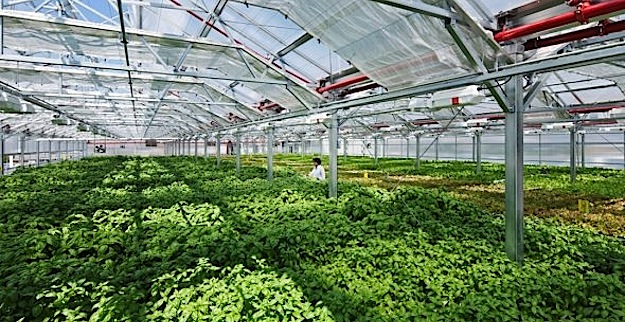All food is local…that is unless you live in Chicago and want a salad in the middle of January. In this case the lettuce in your salad (and the majority of the other ingredients) is most likely grown in Mexico or California and shipped to your local grocery store. However, a few entrepreneurs are trying to change the produce supply chain by growing green, leafy vegetables on a commercial scale in some unlikely places.
As reported in articles last week by Wall Street Journal and Eater.com, rooftop greenhouse facilities have sprouted up in cities across the United States, including New York City and Chicago. These businesses seek to provide consumers with fresh produce that is available in stores within a few hours of harvest, reducing the amount of waste due to spoilage. They also aim to price their products comparably to existing brands since their transportation costs are significantly less as shipping is usually only a short trip across town. Reducing transportation use would also result in a positive environmental impact, which is another one of their goals.
Some urban farms have caught the attention of investors who have contributed millions of dollars in hope of success. But apparently, not all urban farms are created equal. Some, including BrightFarms Inc. and FarmedHere LLC, have cancelled plans to open farms or shut down operations after only a few months in business. However others, like Gotham Greens Farms LLC (which has raised $30 million from investors) and AeroFarms LLC (which has raised $70 million in corporate and project financing), appear to be on track for success.
While it is not clear whether these business models will prove to be long-term successes, potential investors should be familiar with the potential roadblocks that can make or break urban farming businesses. First (and foremost) is cost. Rooftop greenhouses are extremely expensive, upwards of 20% more than a traditional greenhouse. Also, permitting times will increase because “farming” is normally not a permitted use in urban centers and would require a zoning variance. In addition to local laws, growers may be subject to the recently published Produce Safety rule promulgated under the Food Safety Modernization Act, which establishes science-based minimum standards for the safe growing, harvesting, packing and holding of fruits and vegetables. It is important businesses prepare for the implementation of, and the steps required for their business to comply with, the Produce Safety rule.
Investing in agriculture, just as with any other type of investment, requires competent and thorough due diligence. While the investment may look good on paper, investors should remember the saying made famous by President Ronald Reagan: “trust, but verify.”

